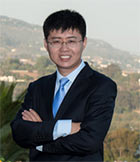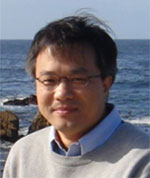Sep
26

Date: 26 September 2023
Time: 2:00 PM ET (New York Time)
Presenter(s): Dr. Shunqiao Sun, Dr. Yimin D. Zhang
Original Article: Freely available for download on the day of the webinar for 48 hours.
Published: IEEE Journal of Selected Topics in Signal Processing, May 2021
Abstract
Millimeter-wave automotive radar emerges as one of the key sensing modalities for autonomous driving, providing high-resolution sensing in four dimensions (4D), i.e., range, Doppler, and azimuth and elevation angles, yet remain a low cost for feasible mass production. In this talk, we will address the challenges in automotive radar for autonomous driving, examine how sparse signal processing can be utilized to optimize the performance of automotive radar systems, and outline future research directions. Our focus will be on the generation of high-resolution radar imaging using multi-input multi-output (MIMO) radar and frequency-modulated continuous-wave (FMCW) technology. We will examine the challenges of waveform orthogonality, radar mutual interference, and sparse antenna array design, and present our recent innovations in the field, including sparse step-frequency waveform, two-dimensional (2D) sparse arrays to enable drive-over and drive-under functionalities, and techniques to mitigate the high sidelobe of sparse array spectra via forward-backward Hankel matrix completion and sparse array design exploiting multi-frequency signals. The talk will highlight the importance of sparse signal processing in achieving high-resolution radar imaging with low mutual interference at low cost. Finally, we will discuss future research directions, including integrated sensing and communication.
Biography
 Shunqiao Sun received the Ph.D. degree in Electrical and Computer Engineering from Rutgers, The State University of New Jersey in Jan. 2016.
Shunqiao Sun received the Ph.D. degree in Electrical and Computer Engineering from Rutgers, The State University of New Jersey in Jan. 2016.
He is currently an assistant professor at The University of Alabama, Tuscaloosa, AL, USA. From 2016-2019, he was with the radar core team of Aptiv, Technical Center Malibu, CA, where he has worked on advanced radar signal processing and machine learning algorithms for self-driving vehicles and lead the development of DOA estimation techniques for next-generation short-range radar sensor which has been used in over 120-million automotive radar units. His research interests lie at the interface of statistical and sparse signal processing with mathematical optimizations, automotive radar, MIMO radar, machine learning, and smart sensing for autonomous vehicles.
Dr. Sun has been awarded 2016 IEEE Aerospace and Electronic Systems Society Robert T. Hill Best Dissertation Award for his thesis “MIMO radar with Sparse Sensing”. He authored a paper that won the Best Student Paper Award at 2020 IEEE Sensor Array and Multichannel Signal Processing Workshop (SAM). He is Vice Chair of IEEE Signal Processing Society Autonomous Systems Initiative (ASI) Steering Committee (2023-2024). He is an Associate Editor of IEEE Open Journal of Signal Processing, and a Senior Member of IEEE.
 Yimin D. Zhang received the Ph.D. degree in applied physics from the University of Tsukuba, Tsukuba, Japan, in 1988.
Yimin D. Zhang received the Ph.D. degree in applied physics from the University of Tsukuba, Tsukuba, Japan, in 1988.
He is currently an Associate Professor with the Department of Electrical and Computer Engineering, Temple University, Philadelphia, PA, USA. From 1998 to 2015, he was a Research Faculty with the Center for Advanced Communications, Villanova University, Villanova, PA, USA. His research interests include array signal processing, compressive sensing, machine learning, convex optimization, and time-frequency analysis with applications to radar, wireless communications, and satellite navigation.
Dr. Zhang is a Fellow of SPIE. He received the 2016 IET Radar, Sonar & Navigation Premium Award, the 2017 IEEE Aerospace and Electronic Systems Society Harry Rowe Mimno Award, the 2019 IET Communications Premium Award, and the 2021 EURASIP Best Paper Award for Signal Processing. He coauthored two papers that respectively received the 2018 and 2021 IEEE Signal Processing Society Young Author Best Paper Awards. He is a Senior Area Editor for IEEE Transactions on Signal Processing. He was a Technical Co-Chair of the 2018 IEEE Sensor Array and Multichannel Signal Processing Workshop.
